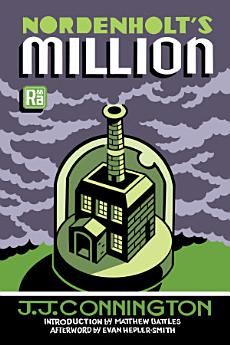Nordenholt's Million
ago 2022 · MIT Press
Libro electrónico
394
Páginas
family_home
Apto
info
reportLas calificaciones y opiniones no están verificadas. Más información
Acerca de este libro electrónico
As a bacteria threatens to wipe out humankind, a plutocrat sets himself up as the benignant dictator of a survivalist colony.
In this novel originally published in 1923, as denitrifying bacteria inimical to plant growth spreads around the world, toppling civilizations and threatening to wipe out humankind, the British plutocrat Nordenholt sets himself up as the benignant dictator of a ruthlessly efficient, entirely undemocratic, survivalist colony established in Scotland’s Clyde Valley. Discovering just how far their employer is willing to go in his effort to spare one million lives, Jack Flint, the colony’s director of operations, and Elsa Huntingtower, Nordenholt’s personal assistant, are forced to grapple with the question of whether a noble end justifies dastardly means.
In this novel originally published in 1923, as denitrifying bacteria inimical to plant growth spreads around the world, toppling civilizations and threatening to wipe out humankind, the British plutocrat Nordenholt sets himself up as the benignant dictator of a ruthlessly efficient, entirely undemocratic, survivalist colony established in Scotland’s Clyde Valley. Discovering just how far their employer is willing to go in his effort to spare one million lives, Jack Flint, the colony’s director of operations, and Elsa Huntingtower, Nordenholt’s personal assistant, are forced to grapple with the question of whether a noble end justifies dastardly means.
Acerca del autor
Under the pseudonym J. J. Connington, Alfred Walter Stewart (1880–1947) wrote seventeen well-received detective novels; Nordenholt’s Million is his only science fiction novel. Stewart was a distinguished British chemist and author of the popular textbooks Recent Advances in Organic Chemistry (1908) and Recent Advances in Physical and Inorganic Chemistry (1909). Via a 1918 theory of the physical chemistry of radioactivity, he contributed the term isobar—as complementary to the term isotope—to science.
Matthew Battles is the author of Library: An Unquiet History, Palimpsest, and Tree, as well as the story collection The Sovereignties of Invention. His writing on the cultural dimensions of science, technology, and the natural world have appeared in the Atlantic, the Boston Globe, and Orion. For Harvard's metaLAB, he develops research into the dark abundance of collections, cultural and technology, and conditions of experience in the context of deep time.
Evan Hepler-Smith teaches the history of science and technology and environmental history at Duke University. He has a special interest in the history of chemicals and chemistry, information technology, and environmental regulation. His book in progress is entitled Compound Words: Chemical Information and the Molecular World. His writing has been published in the New York Times, the Wall Street Journal, Time.com, and Public Books.
Matthew Battles is the author of Library: An Unquiet History, Palimpsest, and Tree, as well as the story collection The Sovereignties of Invention. His writing on the cultural dimensions of science, technology, and the natural world have appeared in the Atlantic, the Boston Globe, and Orion. For Harvard's metaLAB, he develops research into the dark abundance of collections, cultural and technology, and conditions of experience in the context of deep time.
Evan Hepler-Smith teaches the history of science and technology and environmental history at Duke University. He has a special interest in the history of chemicals and chemistry, information technology, and environmental regulation. His book in progress is entitled Compound Words: Chemical Information and the Molecular World. His writing has been published in the New York Times, the Wall Street Journal, Time.com, and Public Books.
Califica este libro electrónico
Cuéntanos lo que piensas.
Información de lectura
Smartphones y tablets
Instala la app de Google Play Libros para Android y iPad/iPhone. Como se sincroniza de manera automática con tu cuenta, te permite leer en línea o sin conexión en cualquier lugar.
Laptops y computadoras
Para escuchar audiolibros adquiridos en Google Play, usa el navegador web de tu computadora.
Lectores electrónicos y otros dispositivos
Para leer en dispositivos de tinta electrónica, como los lectores de libros electrónicos Kobo, deberás descargar un archivo y transferirlo a tu dispositivo. Sigue las instrucciones detalladas que aparecen en el Centro de ayuda para transferir los archivos a lectores de libros electrónicos compatibles.








